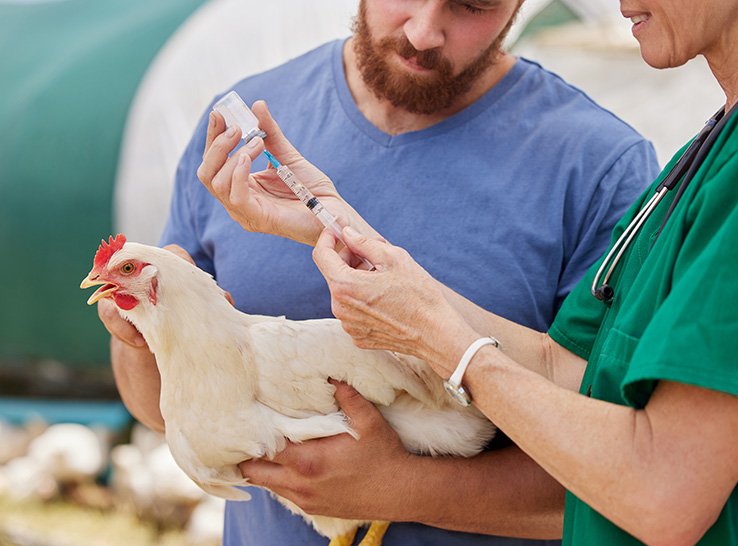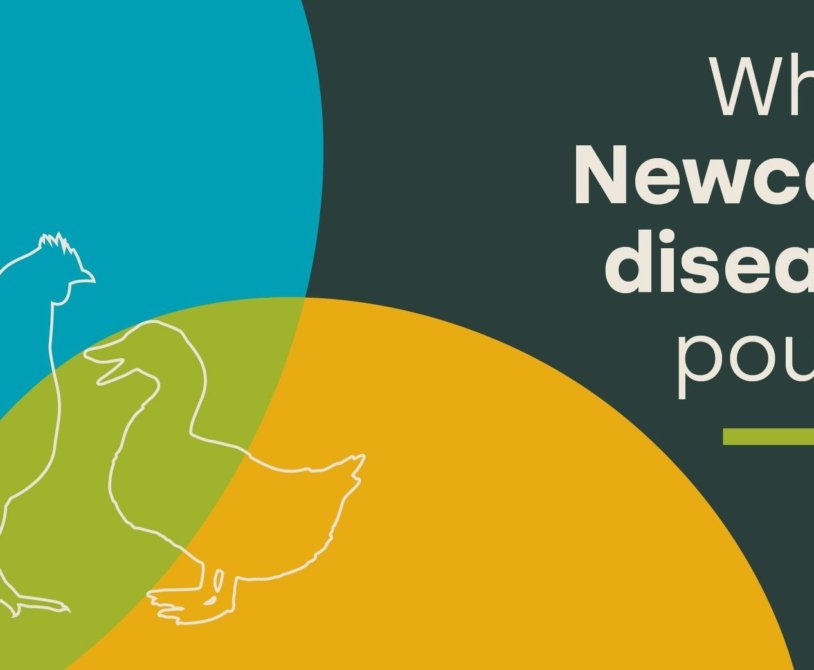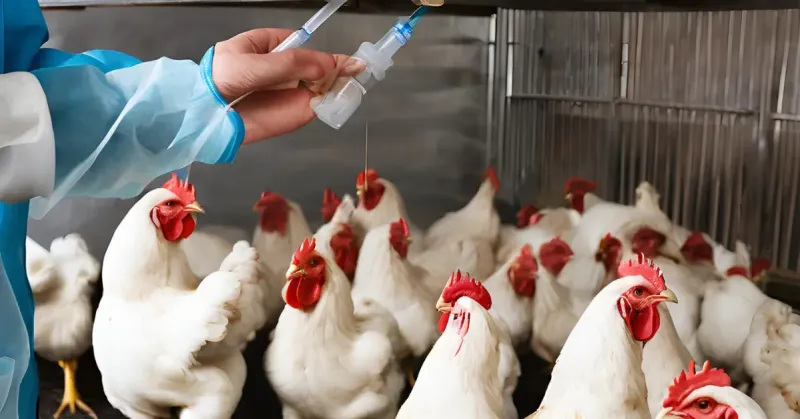Keeping broiler chickens healthy is key for poultry farmers. Vaccination is a top way to protect them. It helps stop common diseases that can harm broiler flocks. This keeps farms productive and profitable.
This article will show you how to use vaccination to protect broiler chickens. We’ll talk about why vaccination is important in broiler farming. We’ll also cover common diseases and the benefits of vaccination.
We’ll share steps to create and carry out a good vaccination plan. This will help keep broiler chickens healthy and performing well.
Key Takeaways
- Vaccination is a critical component of broiler chicken disease prevention and management.
- Understanding common broiler chicken diseases and their prevention is essential for effective vaccination strategies.
- Implementing a comprehensive vaccination program can significantly improve broiler flock health, production, and profitability.
- Proper vaccine administration techniques and biosecurity measures are crucial for the success of a vaccination program.
- Integrating vaccination with other disease prevention strategies offers a holistic approach to broiler chicken health and wellness.
The Importance of Vaccination in Broiler Chicken Farming
Keeping broiler chicken flocks healthy is key in modern poultry farming. Vaccination is a top way to protect these birds from common diseases. This helps farmers keep their flocks healthy and boosts their profits.
Understanding Common Diseases in Broiler Flocks
Broiler chickens face many diseases that harm their health and growth. Marek’s disease, Newcastle disease, infectious bursal disease, and coccidiosis are big threats. These diseases can make birds grow more slowly, die more often, and lay fewer eggs, hurting farm success.
The Benefits of Preventative Vaccination Programs
Vaccination is crucial for broiler chicken farmers. It helps protect flocks from diseases, improving their health and performance. Vaccination boosts immune strength and helps farms stay profitable.
| Disease | Symptoms | Recommended Vaccines |
|---|---|---|
| Marek’s Disease | Paralysis, tumors, reduced growth | Marek’s Disease Vaccine |
| Newcastle Disease | Respiratory distress, nervous system disorders, and decreased egg production | Newcastle Disease Vaccine |
| Infectious Bursal Disease | Immunosuppression, increased susceptibility to other diseases | Infectious Bursal Disease Vaccine |
| Coccidiosis | Diarrhea, reduced feed conversion, increased mortality | Coccidiosis Vaccine |
Broiler chicken farmers can protect their flocks by knowing about common diseases and the benefits of vaccines. This proactive approach helps keep flocks healthy and boosts farm success.
How to Use Vaccination to Protect Broiler Chickens from Common Diseases
Proper poultry vaccination is key to managing broiler flocks well. Knowing the common diseases and choosing the right vaccines helps farmers protect their flocks. This promotes disease prevention in broilers.
Start by talking to veterinary experts. They can spot disease risks based on your farm’s location and climate. Then, they suggest the best vaccine administration plan for broilers.
- Assess disease risks: Work with veterinarians to evaluate the common diseases that threaten your broiler flock, such as Marek’s disease, infectious bronchitis, and Newcastle disease.
- Select suitable vaccines: Choose vaccines that target the specific pathogens of concern, ensuring they are approved for use in your region and compatible with your broiler management practices.
- Establish a vaccination schedule: Implement a proactive vaccination program, administering doses at the optimal times to provide comprehensive protection throughout the broiler’s lifespan.
- Monitor vaccine efficacy: Regularly assess the health and performance of your broiler flock to ensure the vaccines are effectively preventing disease outbreaks.
By focusing on poultry vaccination, broiler farmers can protect their flocks. This approach also improves broiler flock management. It helps avoid costly disease outbreaks, boosting overall disease prevention in broilers.
Developing a Comprehensive Vaccination Strategy
Creating a solid vaccination plan for your broiler farm is key to keeping your birds healthy and boosting productivity. It starts with spotting potential disease risks and weak spots in your farm. This step needs teamwork with vet experts.
Identifying Risks and Vulnerabilities
First, you must check your farm’s biosecurity and disease history. Look at your farm’s layout, how people and things move around, and outside disease risks. Knowing these areas helps you focus your vaccination efforts on the most critical spots.
Consulting with Veterinary Experts
Working with vet pros is crucial for a good vaccination plan. They offer veterinary guidelines for broiler chickens based on new research and best methods. This way, you can create a vaccination plan that fits your broiler farm biosecurity needs, protecting your birds from common diseases.
By being proactive and working together, you can make your broiler farm strong against diseases. This keeps your birds healthy and productive.
Implementing Proper Vaccine Administration Techniques
It’s key to give vaccines to protect broiler chickens from diseases. The right way to give vaccines makes them work better and keeps birds safe from bad reactions. We’ll look at how to give vaccines to broiler flocks in the best way.
Delivery Methods
Vaccines can be given in different ways, like shots, water, or spray. Each way has its own good points and needs special care. Shots let you control the dose better, but water and spray are easier for big groups.
Handling and Storage
Keeping vaccines right is key to their working well. They need to be kept cool, between 35°F and 45°F (2°C and 7°C), away from the sun and extreme heat. Always check the expiration date and follow the maker’s instructions.
Timing and Scheduling
When and how often to give vaccines is very important. Vets can help figure out the best time, based on the birds’ age, how they’re doing, and local disease risks.
- Give vaccines when they’re supposed to for the best protection.
- Think about how things like food and water changes might affect vaccines.
- Watch the birds closely for any bad reactions or problems with the vaccine.
By using these vaccine administration in broilers tips, farmers can make their poultry vaccination programs better. This helps keep their flocks healthy and productive.
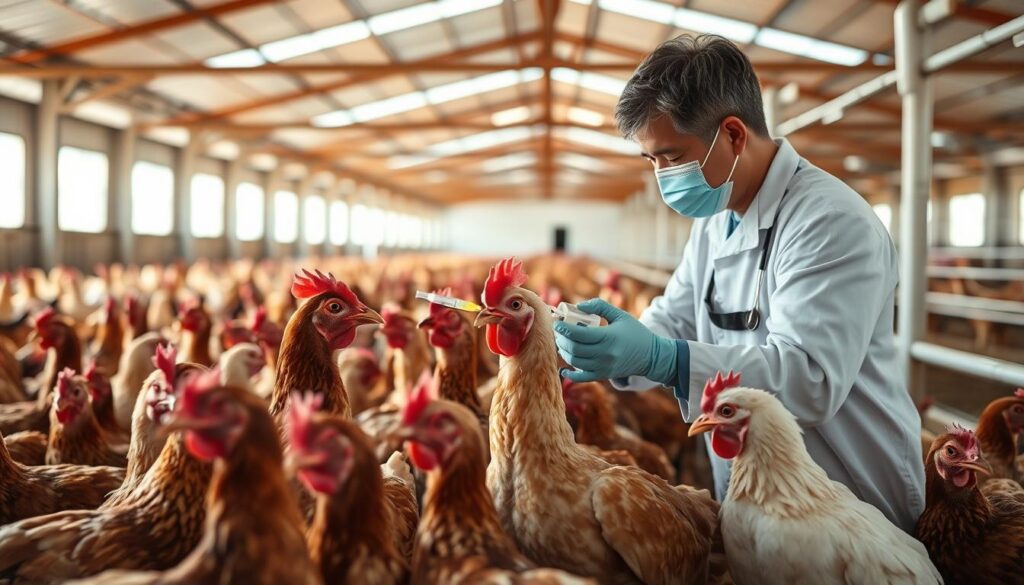
Maintaining Biosecurity Measures on Broiler Farms
Effective broiler farm biosecurity is key to keeping diseases away in broiler chicken farms. By using strong biosecurity steps, farmers can lower the chance of diseases getting in and spreading. This helps their vaccination efforts succeed.
Hygiene and Sanitation Protocols
Keeping the farm clean and sanitary is vital for disease prevention in broilers. This means cleaning and disinfecting everything that touches the birds or their area often. Also, everyone must wash their hands and boots before entering the farm.
Visitor and Personnel Management
It’s also important to control who comes onto the farm. Farmers should have a clear policy for visitors. They must wear protective clothes and get cleaned up before coming in. Farm workers need to know and follow biosecurity rules, too.
| Biosecurity Measure | Description |
|---|---|
| Perimeter Fencing | Install and maintain secure fencing around the farm’s perimeter to control access and prevent the entry of unauthorized individuals or animals. |
| Dedicated Footwear and Clothing | Require all personnel and visitors to wear farm-specific footwear and clothing that is properly cleaned and disinfected before entering the farm. |
| Biosecurity Signage | Post clear and visible biosecurity signage throughout the farm to remind everyone of the protocols and their importance. |
| Controlled Access Points | Designate and strictly control all entry and exit points to the farm to ensure proper biosecurity measures are followed. |
By having a detailed broiler farm biosecurity plan, farmers can help their vaccination efforts. This also reduces the risk of disease in their flocks.
Common Broiler Chicken Vaccines and Their Applications
Keeping broiler chicken flocks healthy is key. Veterinarians and farmers use special vaccines to protect them. It’s important to know how these vaccines work to keep birds safe.
The Marek’s disease vaccine is very common. It fights a virus that can cause serious problems like paralysis and tumors. This vaccine is given early, at the hatchery, to protect the birds from the start.
- Marek’s Disease Vaccine: Protects against a viral infection that can cause paralysis, tumors, and mortality.
- Infectious Bursal Disease (Gumboro) Vaccine: Safeguards the immune system from a viral infection that weakens the bird’s defenses.
- Infectious Bronchitis Vaccine: Prevents a respiratory disease caused by a coronavirus, which can impair growth and egg production.
- Coccidiosis Vaccine: Helps build immunity against a parasitic infection that can cause intestinal damage and reduced feed efficiency.
Vets say to give these vaccines at certain times in a bird’s life. They use both live and killed virus vaccines for the best protection. It’s also important to store and use the vaccines correctly.
| Vaccine | Target Disease | Recommended Vaccination Schedule |
|---|---|---|
| Marek’s Disease | Viral infection causing paralysis, tumors, and mortality | Administer at the hatchery |
| Infectious Bursal Disease (Gumboro) | Viral infectionweakensg the immune system | Vaccinate at 1-2 weeks of age |
| Infectious Bronchitis | Respiratory disease caused by coronavirus | Vaccinate at 1-3 weeks of age |
| Coccidiosis | Parasitic infection causing intestinal damage | Administer live oocyst vaccine at the hatchery |
Knowing about different poultry vaccines helps farmers keep their flocks healthy. This way, they can prevent diseases and keep their birds productive.
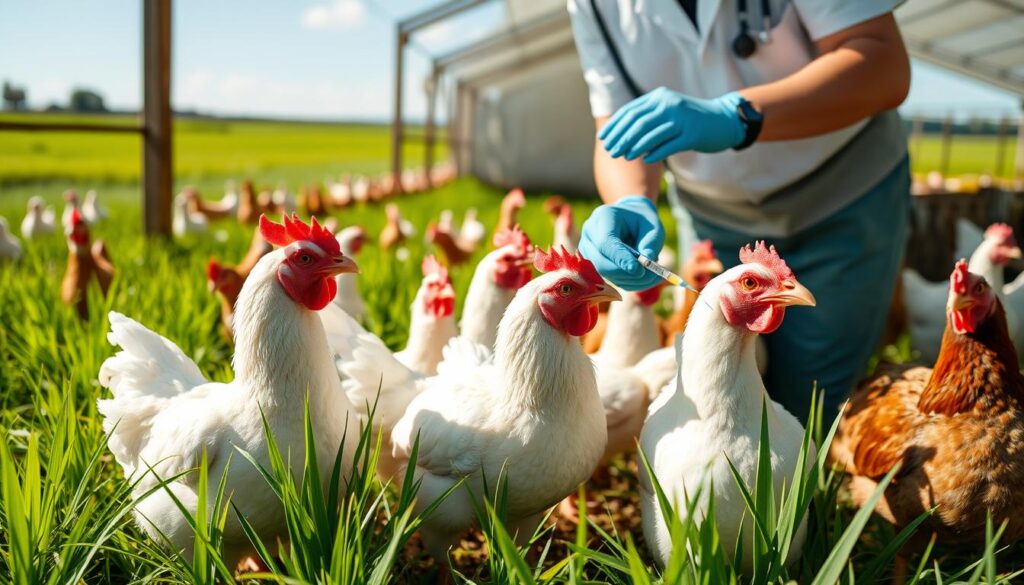
Monitoring and Evaluating Vaccine Efficacy
Keeping broiler flocks healthy is key. It starts with watching how well vaccines work. Farmers need to check the health and performance of their birds. This helps make sure vaccines are doing their job against diseases.
Observing Flock Health and Performance
It’s important to watch the flock closely. Farmers should look at a few key things:
- Mortality rates: Changes in bird loss can show if vaccines are working.
- Growth and feed conversion: Healthy birds grow well and use feed efficiently.
- Clinical signs of illness: Seeing fewer sick birds means vaccines are effective.
- Immune response: Testing antibodies shows how well birds are fighting off diseases.
By watching these signs, farmers can adjust their vaccine plans. This helps keep the flock healthy and well-managed.
| Performance Indicator | Desired Outcome | Potential Issues |
|---|---|---|
| Mortality Rate | Low, within industry standards | Elevated mortality may indicate vaccine failure or other health concerns |
| Growth and Feed Conversion | Steady weight gain, efficient feed utilization | Poor growth or feed efficiency could signal underlying health problems |
| Clinical Signs of Illness | Absence or reduced symptoms of common diseases | Persistent clinical signs may suggest inadequate vaccine protection |
| Immune Response | Satisfactory antibody levels in the flock | Low antibody levels may indicate the need for booster vaccinations |
By watching these important signs, farmers can make sure their vaccines are working. They can then adjust their plans to keep the flock healthy and well-managed.
Integrating Vaccination with Other Disease Prevention Strategies
To keep broilers healthy, vaccination must be part of a bigger plan. This plan includes strong broiler farm biosecurity steps. Together, these strategies help make the flock stronger and healthier.
Good biosecurity is key. It means keeping everything clean, controlling who comes in, and disinfecting often. These steps help stop diseases from getting in and spreading, working well with vaccines.
Also, managing the flock well is important. This means making sure they have good living conditions and controlling pests. By looking at both the environment and health, farmers can make a strong plan to prevent disease.
Using vaccines with other treatments like probiotics or natural boosters adds extra protection. This mix helps the birds fight off diseases better. It makes the whole flock healthier and more productive.
| Disease Prevention Strategy | Key Components |
|---|---|
| Vaccination |
|
| Biosecurity Measures |
|
| Flock Management Practices |
|
| Complementary Treatments |
|
By mixing vaccines with other disease prevention strategies, farmers can protect their flocks better. This complete plan keeps the birds healthy and strong. It’s a smart way to keep the flock safe and thriving.
Overcoming Challenges in Broiler Chicken Vaccination
Starting a vaccination program for broiler chickens comes with its own set of hurdles. Veterinarians must stay alert to vaccine reactions and side effects. This ensures the health and happiness of the flock. By following industry guidelines and keeping a close eye on the birds, farmers can beat these challenges. This way, they can get the most out of preventative vaccination.
Addressing Vaccine Reactions and Side Effects
Vaccine reactions, like fever or swelling, can happen in some chickens. Farmers need to watch their flocks for any signs of trouble. Working with veterinarians is key to handling these issues.
Proper vaccine use, keeping the vaccine cold, and following dosage advice can lower reaction risks. Sometimes, vaccines can lead to serious side effects, like a loss of appetite. If this happens, farmers should talk to their vets about the best next steps.
They might need to try different vaccines or adjust the schedule. This can help protect the chickens without causing more harm.
FAQ
What are the most common diseases that affect broiler chickens?
Broiler chickens often face diseases like Marek’s disease and Newcastle disease. They also deal with infectious bursal disease (IBD) and coccidiosis. These can hurt their health, cause more deaths, and cost money if not managed well.
Why is vaccination important for protecting broiler chickens?
Vaccination is key to keeping broiler chickens healthy. It helps prevent diseases, boosts their health, and saves money on treatments. Vaccines help the immune system fight off common diseases.
What are the key considerations when developing a vaccination strategy for broiler chickens?
When planning vaccinations, it’s important to know the diseases at risk. Working with vets is crucial. They help create a plan that fits the flock’s needs and follows best practices.
How should vaccines be properly administered to broiler chickens?
It’s important to give vaccines the right way. This can be through injection, water, or spray. Always follow the vet’s advice and the vaccine maker’s instructions for safe and effective use.
What biosecurity measures should be in place to support the effectiveness of vaccination programs?
Good biosecurity is key to helping vaccines work. This means keeping the farm clean, controlling who comes in, and following strict hygiene rules. This helps prevent diseases from getting in and spreading.
How can broiler farmers monitor and evaluate the efficacy of their vaccination program?
Keeping an eye on the flock’s health is important. Look at things like how many chickens die, how fast they grow, and any signs of sickness. This helps see if the vaccines are working and where to make changes.
How can vaccination be integrated with other disease prevention strategies for broiler chickens?
Vaccination should be part of a bigger plan to keep chickens healthy. This includes good biosecurity, managing the flock well, and using other treatments. Together, these steps create a strong defense against diseases and keep the flock healthy and productive.
What are some common challenges that may arise when implementing a vaccination program for broiler chickens?
Challenges can include dealing with vaccine side effects, keeping vaccines at the right temperature, and fixing any problems during vaccination. Working with vets can help solve these issues and make sure the vaccination program works well.


